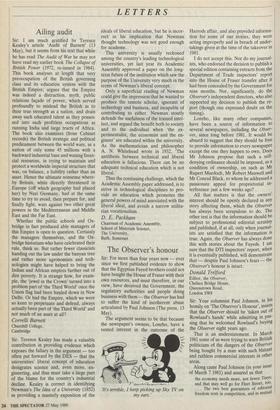LETTERS
Ailing audit
Sir: I am much gratified by Terence Kealey's article 'Audit of Barnett' (13 May), but it seems from his text that while he has read The Audit of War he may not have read my earlier book The Collapse of British Power (1972, re-issued in 1984). This book analyses at length that very preoccupation of the British governing class and its education system with the British Empire; argues that the Empire was indeed a distraction, myth, public relations façade of power, which served profoundly to mislead the British as to their true strength as a nation, and drain away such educated talent as they posses- sed into such profitless occupations as running India and large tracts of Africa. The book also examines (from Cabinet records) the British strategic and political predicament between the world wars, as a nation of only some 45 millions with a backward industrial base and waning finan- cial resources, in trying to maintain and protect a worldwide imperial structure that was, on balance, a liability rather than an asset. Hence the ultimate nonsense where- by Britain, while directly threatened in Europe (off which geography had placed her) by Nazi Germany, had at the same time to try to avoid, then prepare for, and finally fight, wars against two other great powers in the Mediterranean and Middle East and the Far East.
Whether the public schools and Ox- bridge in fact produced able managers of this Empire is open to question. Certainly the managers themselves, and the Ox- bridge historians who have celebrated their rule, think so. But rather fewer classicists handing out the law under the banyan tree and rather more agronomists and tech- nologists might have helped to bring the Indian and African empires further out of dire poverty. It is strange how, for exam- ple, the 'jewel in the Crown' turned into a problem part of 'the Third World' once the Union flag had been hauled down in New Delhi. Or had the Empire, which we were so keen to perpetuate and defend, always actually been part of 'the Third World' and not much of an asset at all?
Correlli Barnett
Churchill College, Cambridge


















































 Previous page
Previous page